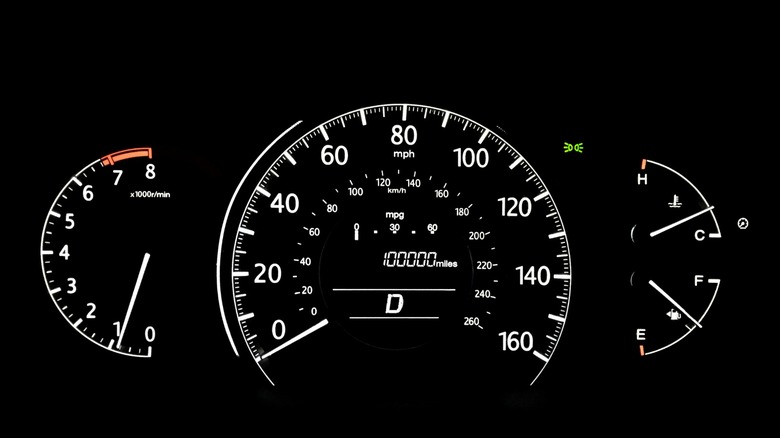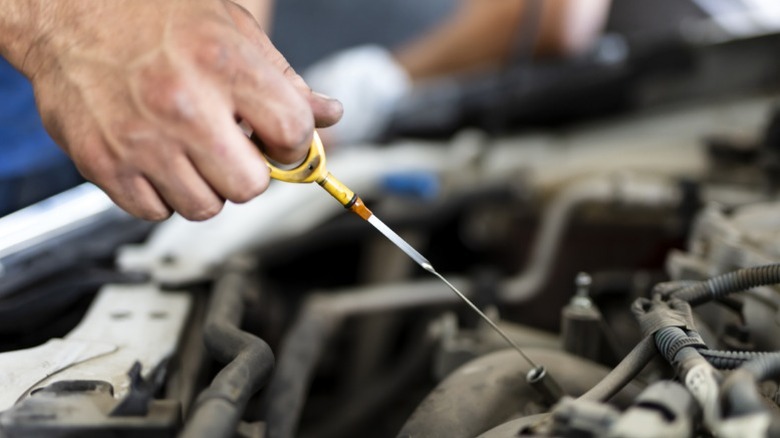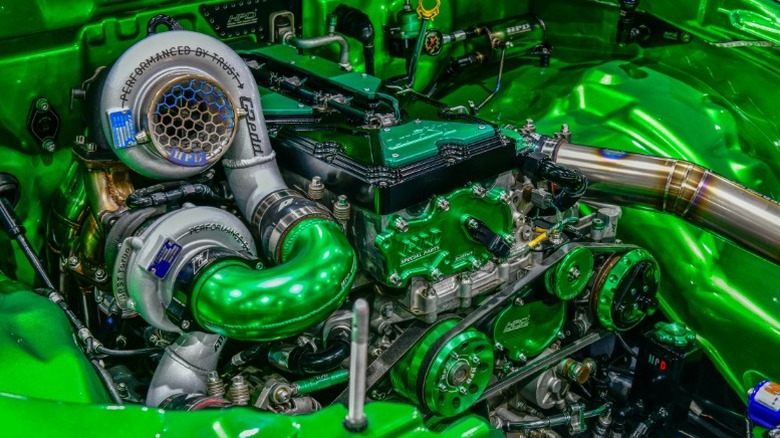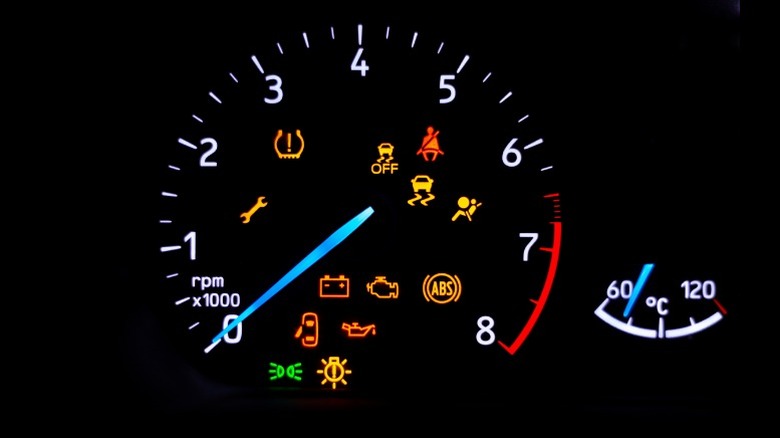Your Car Might Not Reach 100,000 Miles With These Bad Habits
When we buy a car, especially a new one off the dealer's lot, we expect it to perform reliably for many years and thousands upon thousands of miles. Generally speaking, most modern vehicles are capable of reaching high mileage and are, in fact, designed to provide upwards of a decade or at least 100,000 miles of reliable and durable service. However, if you know cars, you probably also know that vehicles are prone to wear and tear over time and require regular maintenance to stay in solid condition. It's not only maintenance that ensures a car's long-lasting performance, though. In reality, there are various things that you should do — and many things that you should not do — if you want to reach the 100,000-mile mark.
Obviously, bad habits, like failing to perform maintenance tasks, are commonly to blame for a car's early demise. However, there's a whole host of other things that you may be doing without realizing how harmful they are for your vehicle. Fortunately, we here at SlashGear can help shine some light on those unhealthy practices. As a former professional mechanic and a lifelong car fanatic, I'll break down six bad habits that can prevent your car from making it to the 100,000-mile mark.
Failing to keep up with routine maintenance
We mentioned that failing to keep up with routine maintenance is an obviously bad habit that can prevent your car from reaching 100,000 miles. However, it's worth covering in greater detail, due to the extreme importance of these maintenance tasks.
Virtually every part of your vehicle requires maintenance, from the engine to the transmission and the brakes to the tires and everything in between. Automotive manufacturers provide detailed timelines for maintenance tasks, which you can find by reading your vehicle owner's manual. Some of the most important maintenance jobs you need to perform include things like oil changes, engine air filter replacements, tire rotations and wheel alignments, coolant services, and more. Many of these jobs are relatively easy and straightforward, meaning you can do them at home if you choose. However, if you're not a home mechanic or a dedicated DIYer, you should pick a reputable shop and visit them regularly for these services.
Failing to keep up with these jobs is a great way to shorten your car's lifespan drastically. If you skip oil changes, your engine is likely to develop issues like overheating or extensive internal damage. If you never service your engine air filter, you may develop performance problems and reduced gas mileage. Each of the service items that your car's manufacturer recommends is vital for its health, and it's critical that you understand these services and perform them regularly if you want your car to reach the 100,000-mile mark.
Improperly installing modifications or installing illegal ones
Installing performance-enhancing modifications can be a great way to boost your car's horsepower. However, there are right ways and wrong ways to modify your vehicle.
When it comes to modifying your car, it's vital that you follow the proper steps and have a basic understanding of automotive tech and power before starting. That means that you shouldn't just dive into making extensive mods without first doing your research. If you want to boost your car's horsepower, you need to start small, especially if you're still planning to use your vehicle as a daily driver. You generally shouldn't jump right into massive modifications like installing a huge supercharger or turbocharger system without first understanding how the increased power will work and whether your vehicle is capable of handling it.
It's also critical that you install mods properly. Even minor modifications, like a cold air intake, can cause issues for your car if you don't install them correctly. Larger and more advanced mods can do even more damage if installed improperly. While modifying your car at home is a viable way to boost its horsepower and a great way to increase your mechanical know-how, it's also an easy way to cause damage. If you're not a car expert, you should consider asking for professional help or, at the very least, do a substantial amount of research before making mods.
Besides legal modifications, there are many illegal car modifications that you need to avoid. Removing emissions control components and installing things like a straight pipe exhaust system may seem appealing at first. However, they can actually harm your car — and the environment — in the long term, and you should avoid them at all costs if you want your vehicle to reach 100,000 miles.
Ignoring dashboard warning lights
Modern vehicles can display various dashboard warning lights when there's a problem with one or more of the car's electronics or mechanical systems. These lights are designed to alert you when there's a malfunction. They can appear for a vast number of reasons, and while these lights may be annoying, it's vital that you don't ignore them.
One of the most common lights you may see appear on your dash is the check engine light (CEL). It turns on when your car's onboard diagnostic (OBD) system detects a malfunction or error with one of the systems that it monitors. The OBD system can trigger the CEL for many different reasons, including things like bad spark plugs, an emissions system error, and even a loose gas cap. In most cases, you have to use a special scan tool to identify and diagnose a CEL, meaning that if you aren't a mechanic and don't own your own OBDII scanner, you'll most likely need to visit a pro.
The check engine light isn't the only warning light your car can display, though. It's equally important that you pay attention to the other symbols that can appear on your dash, too. Things like the anti-lock braking system (ABS) light, tire pressure monitoring system (TPMS) light, and low engine oil pressure light are all serious, and you should address them as soon as possible by visiting a professional mechanic. Failing to do so in a timely manner can lead to substantially worse problems for your vehicle, including increased damage and much more expensive repairs.
Poor driving practices
Failing to perform routine maintenance and ignoring warning lights aren't the only bad habits that can prevent your car from reaching the 100,000-mile mark. Your personal driving habits could also be contributing to your vehicle's early demise. That's because, as is the case with modifications, there are right and wrong ways to drive your car.
It may seem like common knowledge, but treating your belongings with care and using them properly is one of the best ways to ensure that they last for many years. However, not everyone remembers that that advice applies to cars, too. It's often tempting to slam on the gas when taking off from a stoplight, especially if you're in a hurry, but aggressive driving puts a lot of extra strain on your engine. If you drive this way frequently enough, your engine is liable to develop excess wear and tear, and it may struggle to reach high mileage. Aggressive driving habits include everything from taking off too quickly to speeding and weaving in and out of traffic. While only some of those actions are likely to contribute to mechanical damage and wear, all of them put you and your vehicle at risk of accidents, which will certainly affect a car's ability to reach 100,000 miles.
Besides aggressive driving, other bad habits — like frequent driving in stop-and-go traffic or only using your car for extremely quick commutes — can shorten your vehicle's lifespan. For example, if you regularly drive your car for only very short distances, the engine may never have a chance to warm up to a healthy operating temperature. That can lead to increased blow by, which may cause your engine oil to smell like gas and can contribute to a host of other issues.
Ignoring your car's cries for help
We've already covered dashboard warning lights as something that you can't ignore if you want your car to reach 100,000 miles. However, warning lights aren't the only signs of trouble that your vehicle can display. In reality, your car can exhibit various signs of distress, and if you fall into the habit of ignoring them, it's highly unlikely that you'll be able to get 100,000 miles of life out of the vehicle.
When it comes to monitoring your car's behavior for signs of trouble, there are three key things to which you should pay close attention: strange sounds, smells, and sensations. Your vehicle can make a lot of unpleasant sounds if it's experiencing a problem, including things like squealing, grinding, clunking, or hissing noises. You'll also want to keep an ear out for strange engine noises that can indicate problems like worn-out drive belts or an issue with the combustion process. Odd smells are also indicative of problems and can take the form of fuel odors, a burning rubber smell, or a rancid mildew aroma. Concerning sensations include things like your car lurching into gear, a vibrating steering wheel, or shaky tires. All of these issues can indicate that your car has a problem, and it's vital that you don't ignore them or write them off if you experience them yourself.
Besides monitoring any strange sounds, smells, or sensations your car makes, you should also keep an eye out for leaks and obvious signs of damage. That ties into your routine maintenance plan, as you should be inspecting these things regularly. Ignoring any of your car's cries for help is a great way to ensure that it never reaches the 100,000-mile mark.
Failing to perform non-mechanical maintenance
We've mentioned that performing routine maintenance — as outlined by your vehicle's manufacturer — is one of the most important things you can do to help your car reach 100,000 miles. However, failing to perform that maintenance is far from the only bad habit that will cut your vehicle's life short. It's also not the only form of maintenance that you need to perform.
When it comes to non-mechanical maintenance, one of the best things you can do for your car is keep it clean. You may not think of visits to the car wash as helping to extend your vehicle's life. However, depending on where you live, regular washes can have a huge impact on your car's lifespan. That's because driving exposes your vehicle to a lot of debris, dust, and harsh chemicals. If you live somewhere with particularly heavy winters, you may already know that ice and road salt are horrible for your car. Over time, these things can contribute to rust and corrosion, often in areas that aren't immediately noticeable, like the vehicle frame and undercarriage. While you may maintain your engine perfectly, your car won't make it very far down the road if its frame and other things like the suspension system are extremely corroded.
It's not just those who live in snowy areas that need to worry about this, either. If you live in an extremely humid environment, washing your car regularly, and especially after bad weather, can help prevent the development of corrosion. To go one step further, you can apply a layer of car wax to provide a moisture barrier and keep your vehicle looking pristine between washes.






